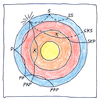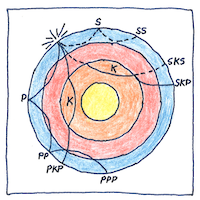Inge Lehmann
geophysics

|
Inner core
Inge Lehmann studied seismograms from earthquakes in New Zealand and found seismic waves that reflected from a boundary below the molten core. At the boundary of the inner core, crystallized fragments of the molten outer core accumulate.
Composition
Mostly iron alloyed with nickel and other elements that dissolve readily in iron— gold, platinum, iridium, osmium, rhenium, palladium, rhodium, ruthenium, molybdenum, cobalt, manganese, but, really, there’s no way to obtain a sample for testing.
Myths of the interior
Our planet’s interior could be a metaphor. We cannot penetrate it, except in our fantasies. But that’s probably too simple. Creation myths, conspiracy theories, a place for aliens and dinosaurs—anything goes where nothing can be refuted by firsthand experience.



The deepest gold mine in South Africa is only 11,762 feet (2.23 miles) deep. The Kola Superdeep Borehole SG-3 is the deepest hole at 40,230 feet (7.62 miles). Earth’s crust varies in depth, from 3 miles under oceans to 60 miles under continents.
See also in The book of science:
Readings in wikipedia: